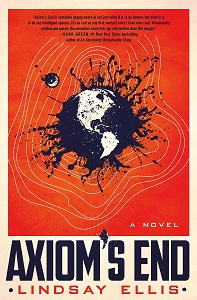Cora Sabino never wanted to participate in world-shattering political changes, but the choice isn’t hers to make. Adrift in 2007 Los Angeles, Cora bounces through temp jobs she hates and can’t stick with. Her father, a government whistleblower, abandoned her years ago, more interested in ideals than his very concrete family. Then, one boring weekday in September, 2007, Cora witnesses a UFO crash-land in the hills above Altadena, California.
Film critic, screenwriter, and YouTube personality Lindsay Ellis has already earned a Hugo Award nomination for writing about science fiction. Her first novel turns from describing the genre, to participating in it. The transition is occasionally rocky, with its kitchen-sink approach to genre tropes, and its sometimes verbose expository dialog. But especially for genre fans and readers interested in her winking references, it’s an engagingly complex first effort.
Because Cora’s father claims government agents are already harboring extraterrestrials, Cora has suits in black sedans trailing her around L.A. But after the UFO crash, the CIA actually walks into her mother’s living room, asking pointed questions. Cora is apparently neck-deep in conspiracies without her consent. Things only get worse when, shrouded by urban midnight, she spots an alien dismantling her computer. Apparently, the aliens are specifically targeting her.
Old secrets come spilling quickly. While Cora’s father thinks himself a secular prophet and dishes dirt because the truth will set Americans free, her aunt works for a Men-In-Black agency. Caught between the skulking alien and the government alien hunters, Cora flees into Los Angeles County’s urban jungle. There she makes First Contact—or so she thinks. Evidently, America has known about its aliens for decades.
Science fiction audiences will recognize multiple nods to their beloved genre salted generously throughout the book. The title obviously references Arthur C. Clarke, and like Clarke, Ellis describes the damages left when childhood illusion falls away. Except for Ellis, childhood’s end isn’t gradual or revelatory, it’s violent. Ellis also uses David Brin’s ideas about the uniqueness of human evolution, and Orson Scott Card’s ideas about how brittle society’s structures are.
Most prominently, however, Ellis uses Stanisław Lem’s ideas about the fundamental impossibility of communication between humans and extraterrestrials. Chosen by a mysterious, seemingly warlike emissary to serve as translator for humanity’s government, Cora struggles to comprehend the aliens’ words, actions, and apparent value system. But communication goes deeper than words, and Cora’s inability to reconcile extraterrestrial language becomes a major impediment.
 |
| Lindsay Ellis |
Don’t tell me science fiction isn't timely.
Ellis’ story ranges widely, mostly throughout the western United States. Cora flees from Los Angeles to the Central Valley, out into Nevada, eventually becoming trapped in a government facility in Colorado. She also visits other locations, like Virginia and the Inland Empire, though very briefly; the story caroms with the urgency of an X-Files episode, taking in the highlights of an Ansel Adams visual tour of America. And I mean visuals; Ellis describes scenes richly.
This strikes an uneasy balance. With her filmmaking background, Ellis crafts a world rich in sensory detail. But she’s primarily a documentarian and critic, accustomed to unpacking other writers’ subtext, translating words left unsaid into vernacular English. She does that here, too, with the sometimes sluggish tendency to have characters explain situations to one another, sometimes extensively. Her own work has remarkably little subtext.
This might, perhaps, be deliberate. Because Cora discovers that humans and Fremdans share no metaphors, cultural context, or even body language, they can only communicate in words. But even words are imprecise, and often need clarification when speaking with others who don’t share your background. Throughout this novel, the futility of communication is Ellis’ most recurring theme. Perhaps she foregrounded this purposefully.
Because she combines visual and linguistic motifs, and because she lovingly poaches existing genre tropes, Ellis essentially chooses her audience. Readers already familiar with science fiction, in all its messy glory, will find much in this novel to enjoy. Having read the genre for over thirty-five years now, I can’t speculate how outsiders might receive it. As a fan, reading Ellis’ novel left me feeling acknowledged. Maybe that’s the point.

Always keen to try new sci fi.... I'll look out for it thanks
ReplyDelete